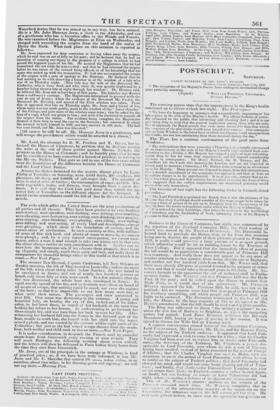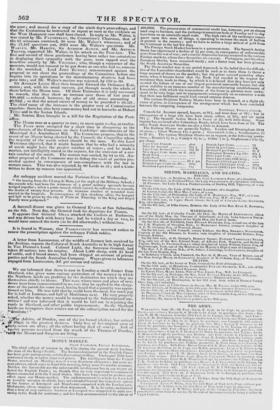Business in the House of Commons, last night, was commenced
by the rejection of the Portland Cemetery Bill ; the third reading of which was moved by Mr. Thomas Dem:oohs:. Mr. Buncombe la- boured hard to persuade the House, that, so far from this measure being one to deprive the people of their pleasure-ground on Primrose Hill, it really 'would preserve a large portion of it as open ground, which otherwise would be let in building leases by the Trustees of Eton College. But it appeared that the immediate effect of passing the bill would be to appropriate a considerable part of Primrose Hill to a cemetery. And really there does not appear to be any want of another cemetery in that quarter, there beilig already one at Highgate, and smother not five hundred yards from that. Mr. Wisiss said, that there were already 470 acres of ground devoted to the purpose of ceme- teries, and that it would take a dams:old years to fill them. Mr. AG- LIONIN brought to the opposition the aid of tecludeal skill in Parlia- mentary forms. Mr. IVAKLLI said that Primrose Dill was the Hyde Park of the poor ; and he called upon the House to protect their Hyde Park, as it would that of the aristocracy. Mr. CHARLES BULLER supported the bill. Primrose Hill, lie said, was not to be touched : but we suppose some land that is as good as Priinrose Hilt for Cockney moralizing, and which people call Primrose Ilill, was liable to be enclosed. The discussion terminated in the less of the bill ; the House, by time large majority of 1$3 to 47, :ten ed to Mr. ilumt:'s amendment, that the bill should be read ti.at day three months. The King was addressed to direct " the militioy eagineer" to ex- amine the new line of Railway to Brighton, on whi the competing parties had agreed. Lord JOHN ItcssEt.f, withdrew tine Borough Boundaries Bill, having no hope of passing it this session. It Wan agreed to discuss the Wills Bill on Tuesday week.
A curious conversation ensued between Sir STRATFORD CANNING, Lord PALMLIISTON, Mr. HAftvEy, Mr. lit-ME, and Sir ItonEnT
on the subject of the Turkish embassy. It appeared that Lord Pon- sonby had expressed a wish to come home for a time ; that Sir Charles Vaughan had been sent out to replace him as A Rase sailor Extraordi- nary,—the Secretary of the Embassy, Mr. Urquhart, a perssm dis- agreeable to Lord Ponsonby, over whom he was a sort of Viceroy, having been recalled, instead of being promoted to the pu-t of 0E1;4 d'Affaires; that Sir Charles Vaughan was sest to Malta, sa ith in- structions to await the arrival of Lord Ponsonby, with whom he was to confer on the subject of Turkish polities ; that Lord Poasoubv had changed his mind, and would not come home (having got rid of Claps- liart) ; and finally, that Ambassador Extraordinary %%what; was now on his return from Malta to Englatol—eutting a rather foolish figure, no doubt, but not looking so simple as Lord Palmerston did Lest night, when ai tempting a defence id Iii diplomatic m eangements.
One of Mr. WALTER'S abortive niOtit/10, 1.111 the stelsiect of the Pth-r- law tircuiiied much time. Mr. 11'..t.rmt complains, that in sspieosc of the overpowering iis6ority of his opponents On the (istaiittee, the witnesses against the hill (smut get f Or play. He ail some private letters, to show that its operation was g...evuus we the poor; and moved for a copy of the ninth day's proceedings, and that the Committee be instructed to report as soon as the evidence on the West Hampnett case shall have closed. In reply to Mr. Walter, it was stated by Mr. FAZAKERLEY, the Committee's Chairman, that of the 61 witnesses examined, 38 were Mr. Walter's witnesses; and of the 17,187 _questions put, 3870 were Mr. Walter's questions. Mr. WAKLEY, Mr. HARVEY, Sir ANDREW AGNEW, and Mr. ARTHUR Tasvon, supported Mr. Walter, in his attack on the Poor-law. The first arid second of these gentlemen having been rather too ostentatious in displaying their sympathy with the poor, were rapped over the knuckles smartly by Mr. VILLIERS; who, though a supporter of the measure, would not consent to be put down as one who had no concern for the wretched. Lord Joust RUSSELL remonstrated against the proposal to cut short the proceedings of the Committee before any Inquiry into its operations in the manufacturing districts had beed gone into ; and Mr. Walter's motion was rejected, by 119 to 30. Sir ANDREW LEITH HAY then brought forward the Ordnance Esti- mates ; and, with his usual success, got through nearly the whole of them before the House rose. Of these Estimates it is only necessary to remark, that they show an increase over those of last year of 100,4661. — reduced, however, by sales of old stores amounting 40,935/. ; so that the actual excess of money to be provided is 59,52l. The chief cause of the increase is the greater cost of Commissariat supplies : there has also been some money laid out in barracks at Hobart Town and in the Ionian Islands.
Mr. SPRING RICE brought in a bill for the Regulation of the Post- office.
The !rouse rose at a quarter to two ; to meet again to-day, at twelve. The Peers were occupied for a short time in disayreeiny to the amendments of the Commons on their Lordships' amendments of the
Municipal Act Amendment Bill. The Commons propose, that in the event of no Mayor being elected by the Council, the Councillor whom the majority of the wards select should be the man. To this Lord
WYNEORD objected, that it might happen that he who bad a minority of wards might have the greater number of voters ; and he made a motion, not intelligibly stated in the reports, for the omission of a cer- tain number of the wards. The motion was carried, by 84 to 63. An- other proposal of the Commons was to defray the costs of parties pro- ceeded against in consequence of non-compliance with the law in Certain cases. This was also rejected, by 80 Lords to 51 ; and a Coin- mime to draw up reasons was appointed.



























 Previous page
Previous page